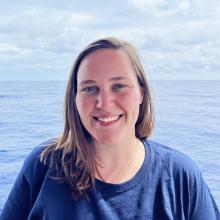
Logan Kline
Tell us about your work/research. What kinds of things do you do?
My work and research experience has varied as I am still figuring out what I want to be when I grow up! Currently, I sit between the Science & Technology and Outreach & Education divisions at NOAA Ocean Exploration and largely focus on communicating about our office's research, expeditions, and the exciting science that we fund. In the past, I have researched mechanisms of integrating artificial intelligence into wildlife monitoring using remotely sensed imagery, evidence of illegal fishing activity in marine protected areas using passive acoustics, and the presence of vessel noise in important cetacean breeding areas. I am especially interested in using novel technologies to monitor and conserve wildlife.
What sparked your initial interest in your career?
I grew up visiting the Chesapeake Bay as a child in Maryland, and my love for coastal and ocean wildlife blossomed from watching ospreys, great blue herons, horseshoe crabs, and a host of other critters in their natural habitats. When I went to the University of Maryland for my undergraduate degree, I had an amazing internship that took me out into wetlands and other seaside habitats to band seabirds, conduct submerged aquatic vegetation surveys, and educate younger students on the world of marine conservation. Taking courses in geospatial information systems (GIS) and remote sensing helped me recognize my penchant for coding and new technologies, and I discovered I could connect my passion for wildlife with an interest in novel technology during an opportunity through the Ernest F. Hollings Undergraduate Scholarship with NOAA.
Who influenced you or encouraged you the most?
The list is honestly endless. I was influenced as a child by watching Steve Irwin and his family wrangle wildlife in the Australian outback. Several teachers, from elementary school through graduate school, nurtured my love for science. The amazing Passive Acoustics Research Group at NOAA Northeast Fisheries Science Center took me in and taught me all about "good science" while fostering an environment of innovation and embracing new ideas. My family and partner have also encouraged me through every new chapter.
What element of your work/study do you think is the most fascinating?
I am enthralled by every small detail about seabirds and marine mammals. My official role on a NOAA Ship Okeanos Explorer expedition I went on recently was for communications, but I very quickly became known as the bird nerd of the trip for my various seabird fun facts. Did you know that albatross and other tube-nosed birds excrete salt through their nostrils?
How did you get involved with the Ocean Exploration Trust?
I have the great opportunity to participate in this expedition through my position with NOAA Ocean Exploration as their 2023 John A. Knauss Marine Policy and Science Communication Fellow.
What other jobs led you to your current career?
I have enjoyed a host of jobs by pouncing on internship and career opportunities since I was an undergraduate. While I was at the University of Maryland, I interned with the National Aquarium and partners doing urban conservation and education projects, worked in visitor services at a National Wildlife Refuge, completed an Ernest F. Hollings internship at the Northeast Fisheries Science Center (NEFSC) doing passive acoustics research, assisted graduate students with research on coastal wetlands, and worked as a project lead for a NASA DEVELOP project at Goddard Space Flight Center. I then contracted at NEFSC doing passive acoustics research before I went to graduate school at the University of Maine. Before beginning my Knauss fellowship position at NOAA Ocean Exploration, I took time to refresh by working part-time at an animal shelter and doing more creative work for the NEFSC Passive Acoustics Research Group.
What are your degrees and certifications?
Bachelor of Science in Environmental Science and Policy, Marine and Coastal Management concentration, with a minor in Meteorology -- University of Maryland, 2018
Master of Science in Ecology and Environmental Science -- University of Maine, 2022
What are your hobbies?
I volunteer at my local animal shelter and can be found fostering kittens (and the occasional hermit crab) and helping other foster animal parents. I also enjoy birding, walking my dogs, keeping my cats from destroying our house, and drawing.
What advice would you have for someone who wants to have a career like yours?
Learn the technical tools of your trade! If you have a knack for coding or working on computers, that can be the key to getting hired. Even if you wouldn't say you're a computer buff, I recommend gathering at least basic skills in GIS, Python, and R. There are free courses online, Python and R are free to use, and QGIS is an open-source GIS that anyone can use. Also, and importantly, be open to different ways of thinking than yours! Just because someone has a different toolset, expertise, or way of approaching problems than you do, that doesn't mean that they are wrong or less qualified. Collaboration and extending grace to others is a key component of successful science.
Expeditions
Logan participated in the following Ocean Exploration Trust expeditions:
